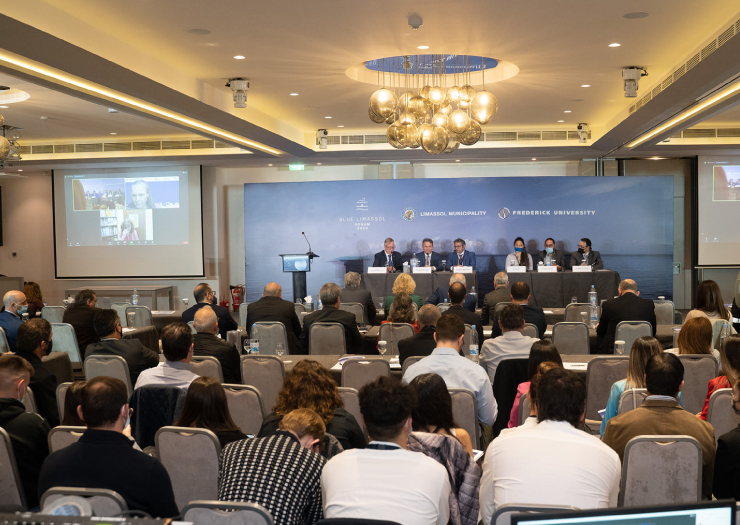
First holistic environmental risk assessment study of Limassol coastal zone presented by Frederick University

Transition to sustainability requires coordination and long-term planning says study conducted by Frederick University and Limassol Municipality.
A research study presented during the 2nd Blue Limassol Forum on March 30th highlights the need to effectively monitor the growing risks to the coastal, marine and maritime environment of Limassol. The study, which was conducted by Frederick University on behalf of Limassol Municipality, is the first environmental risk assessment study to examine holistically and simultaneously all the developmental and operational activities in the coastal Limassol area that may pose risks to the city’s environment. It identifies and assesses potential threats and provides recommendations regarding best practices for the protection of the sea and coastal environment. The study calls on all stakeholders involved to work together and take joint action to address the challenges ahead, with the ultimate goal of ensuring the sustainability and quality of life in the city of Limassol.
This year’s Blue Limassol Forum took place both physically at Crowne Plaza hotel in LImassol and online in the presence of more than 400 delegates of governmental bodies, environmental NGOs, academics and representatives from all sectors operating in the coastal Limassol area.
Addressing the Forum, Shipping Deputy Minister Mr Vassilios Demetriades underlined the sector’s importance for Limassol and Cyprus, the government actions and initiatives in promoting a holistic approach towards maximizing the growth potential of our seas in an environmentally sustainable way. Mr. Demetriades congratulated Frederick University and the Steering Committee for the Blue Limassol Environmental Risk Assessment Study which provides useful recommendations in the formulation of national policies and actions. Towards this direction, Mr. Demetriades referred to the national integrated maritime policy of Cyprus and announced that the 60-days public consultation for the formulation of the Maritime Spatial Plan of Cyprus will commence on 31 March followed by a series of local meetings with all interested parties and the civil society, covering all coastal regions of Cyprus, starting from Limassol on 11 April.
Welcoming the participants to the Forum, the Mayor of Limassol, Mr Nicos Nicolaides, said that one of the main goals of the Municipal Council is enhancing the potential of blue economy in Limassol and referred to a series of initiatives taken by the Municipality in this framework. These initiatives include the introduction of Blue Limassol Forum, the decision to carry out the first holistic Risk Assessment Study for Limassol coastal area, and the operation of the Blue Innovation Centre which focuses on topics related to blue economy and shipping. The Mayor expressed his appreciation to Frederick University for the cooperation and support in the efforts of Limassol Municipality to promote blue economy and ensure Limassol’s leading role in the development, technology and economic activity of Cyprus.
The Vice President of Frederick University Council, Dr Christoforos Charalambous, also addressed the Forum: "These challenges are immense and they cannot be addressed without adopting a holistic and multidisciplinary approach” commented Dr Charalambous, who also praised the University’s Department of Maritime Transport and Commerce for the coordination of the Risk Assessment Study. “It is the first department of its kind in Cyprus and has been a dominant educational force in the field for several decades, importantly maintaining also strong links with the Sector thus balancing theory and practice” he said. He also congratulated Limassol Municipality for establishing Blue Limassol Forum.
The risk assessment study was presented by the Project Manager, Dr Angelos Menelaou, Head of the Department of Maritime Transport and Commerce of Frederick University, and Dr Michael Makrominas, Assistant Professor at the Department. The study focuses on all main sectors operating in the coastal Limassol area: Energy, Oil & Gas, Commercial Shipping, Marinas & Yachts, Construction, Sewage & Litter and Aquaculture & Fisheries. The findings indicate that, while the environmental pressures and risks in each sector are not assessed as particularly significant, in their entirety -and given the factor of continuous and rapid growth and rapid population accumulation- they will be factors of environmental degradation. According to the study findings, the fragmentation of responsibilities and services in monitoring all sectors of the economy and lack of data integration both constitute a weakness to the system. It is therefore suggested that all sectors of the economy along the Limassol coast should operate under a guiding strategy of data integration, improved reporting and better use of technology, towards a holistic approach of sustainable development and environmental protection. “The research took under consideration the opinion of more than 500 citizens who participated in an initial opinion survey. It turned out that the citizens’ environmental concerns were fully justified”, said Dr Angelos Menelaou.
Presentations by this year’s guest speakers showcased the need for coordination and long-term planning for the transition to sustainability. Specifically, Professor Carola Hein, Head of the History of Architecture and Urban Planning at Delft University of Technology (Netherlands), spoke about the energy transition in the case of the Rotterdam Harbor and explained that the lack of a long-term plan was an obstacle to its implementation. An equally important topic was addressed by Professor Rachelle Alterman, Head of the Lab on Comparative Planning Law and Land Policy and Senior Research Fellow at Neaman Institute for National Policy Research of Technion – Israel Institute of Technology. Prof. Alterman spoke of the need to bridge the legal-institutional gap in Mediterranean coastline management, explaining how a complex legal framework is neither effective nor helpful towards the goal of sustainability.
The Forum’s coordinator, Captain Eugen Adami, President of CYFOS and a Faculty member of the University’s Department of Maritime Transport and Commerce, highlighted the need for a comprehensive strategic plan to achieve a realistic transition towards sustainability. “All stakeholders should be consulted in this planning: the scientific and academic community, government agencies and the civil society, who should also be involved in the decision-making process”, said Captain Adami. In his final remarks, the Project Manager Dr Menelaou underlined the importance of adhering to the framework of a pre-agreed strategic planning. “Individual and short-term benefits cannot derail this planning towards sustainability", commented Dr Menelaou.
The full report with the findings of the study can be found in this link: https://www.limassol.org.cy/el/blue-limassol-forum-2022-research

